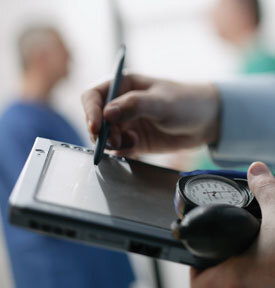by
Olga Deshchenko, DOTmed News Reporter | January 25, 2011
The government's faith in electronic health records is backed by billions of dollars, but a new study suggests the technology might offer little benefit to patient care.
The study, published Monday online in Archives of Internal Medicine, casts doubt on the advantages of EHRs over paper records.
For the article, researchers examined more than 250,000 patient visits to physician offices and clinics. They looked at data from two large prospective surveys -- the National Ambulatory Care Survey and the National Hospital Ambulatory Medical Survey from 2005 to 2007.
EHRs' benefits proved to be paltry. Diet counseling for high-risk adults was the only index of care quality of out 20 that showed dramatically better performance when physicians used EHRs rather than traditional record-keeping systems, according to the study. Providers using EHRs advised high-risk adults on diet in 28.2 percent of the visits, compared to 19.7 percent of visits with paper records.
Adding clinical decision support to EHRs didn't fare much better. Only one indicator -- not ordering electrocardiography studies for low-risk patients -- was better with the use of EHRs. Low-risk patients avoided ECG studies in 97.7 percent of the cases when physicians used EHRs, compared to 93 percent of cases where providers lacked the clinical decision support tools.
This finding refuted the authors' hypothesis that clinical decision support is associated with improved care quality. "Some studies suggest that certain guidelines and clinical areas lend themselves well to CDS intervention, while others do not. However, the lack of association between EHR and CDS and care quality in our study fails to support such conclusions," authors Max J. Romano and Dr. Randall S. Stafford, both with Stanford University, wrote in the study.
The American Reinvestment and Recovery Act stimulus bill allocated $19.2 billion for the promotion and adoption of health information technology.
"Given the growing institution-specific evidence that CDS use increases the quality of health care services, our results raise doubts about past implementation of costly EHR technologies nationally," the authors wrote. "While EHRs offer substantial administrative efficiency over paper records, current patterns of EHR and CDS use do not appear to translate into better outpatient quality of care."
Some of the study's limitations included a limited patient sample and data that may not reflect current practice patterns, the researchers said.
Back to HCB News
